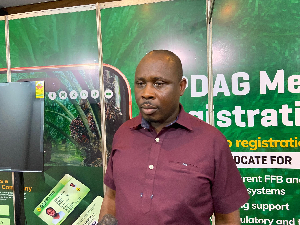….As sector ministers educate populace on 2012 budget
By Eric Joe Ayivi
The Minister for Environment, Science and Technology, Madam Sherry Ayittey, has noted that no country can develop without maximum appreciation and utilization of science and technology in its growth agenda.
According to her, the development of Ghana largely depends on the development of Science and Technology and accused the NPP administration of neglecting the development of science by scrapping the Science and Technology Ministry.
Madame Sherry Ayittey was speaking at a forum organized by the Ministry of Information as part of the 2012 budget education to help people understand the developmental programmes of the government aimed at an accelerated infrastructural development for sustained industrialization take off to create jobs.
According to the Minister, government under the Mathematics Science and Technology Scholarship Scheme (MASTES) has demonstrated it is committed to making science education interesting and affordable and will continue to support the needy but brilliant students to pursue the subject at both tertiary and Senior High School levels. 2,000 more students would benefit from the 2012 Mathematics Science and Technology Scholarship Scheme (MASTES) to promote and rekindle the interest of science and mathematics among students.
She disclosed that 6,000 laptop computers would be provided to facilitate the science subject and promotes skills among students. Deputy Minister for Finance, Hon. Fifi Kwettey in his address noted that the 2012 Budget looks more promising because it is centered on infrastructural development and job creation. According to him, the Mills-led government has been accountable to Ghanaians by letting them know how their revenues are been managed.
He stressed that irrespective of the numerous challenges facing government, it has been able to migrate 97 per cent of public service workers onto the Single Spine Salary structure. “At the end of 2009, the NPP left 3.1 billion arrears for the country but the Mills government has settled it,” he said. Hon. Moses Asaga, MP for Nabdam, argued that the Mills-led administration is the only government that has been transparent to the people of Ghana.
He stated that all the uplift of oil has been made known to Ghanaians including the revenue that has accrued from the oil production. According to him, the NPP’s confusion in the interpretation of the 2012 budget is a lack of understanding of common economics of the critical role infrastructure plays to achieve a sustained economic growth for industrialization. Dzifa Attivor, Deputy Minister for Roads and Transport noted that the 2012 budget is the only budget in the country’s history to make adequate provision for infrastructure.
She disclosed that the Eastern Corridor road, the Western railway line, the Takoradi Harbour and the landing sites at the coastal belt would begin next year. According to the Minister of Education, Hon. Betty Mould Iddrisu, the 2012 budget has provided a platform for the education ministry to move forward. 10 million Ghana cedis, she said, has been allocated for the construction of the universities in the Volta and Brongh Ahafo regions.
Budget
allocations for the free school uniforms and free exercise books programmes have seen increments from GH¢3 million to GH¢28.8 million and GH¢7 million to GH¢28 million respectively.
Other speakers at the forum like Ms Hannah Tetteh, Minister of Trade and Industry; Hon. Haruna Iddrisu, Minister of Communications; Hon. Okudzeto Ablakwa, Deputy Minister of Information; Tony Aidoo, Head of Economic Evaluation had a strong convictions that the 2012 budget would bring more infrastructural development and job creation to the good people of Ghana.
They applauded government’s commitment to develop the country in an open and transparent manner, especially the accountability of the oil revenue and the various pro-poor interventions to fight poverty.
General News of Thursday, 24 November 2011
Source: Eric Joe Ayivi












